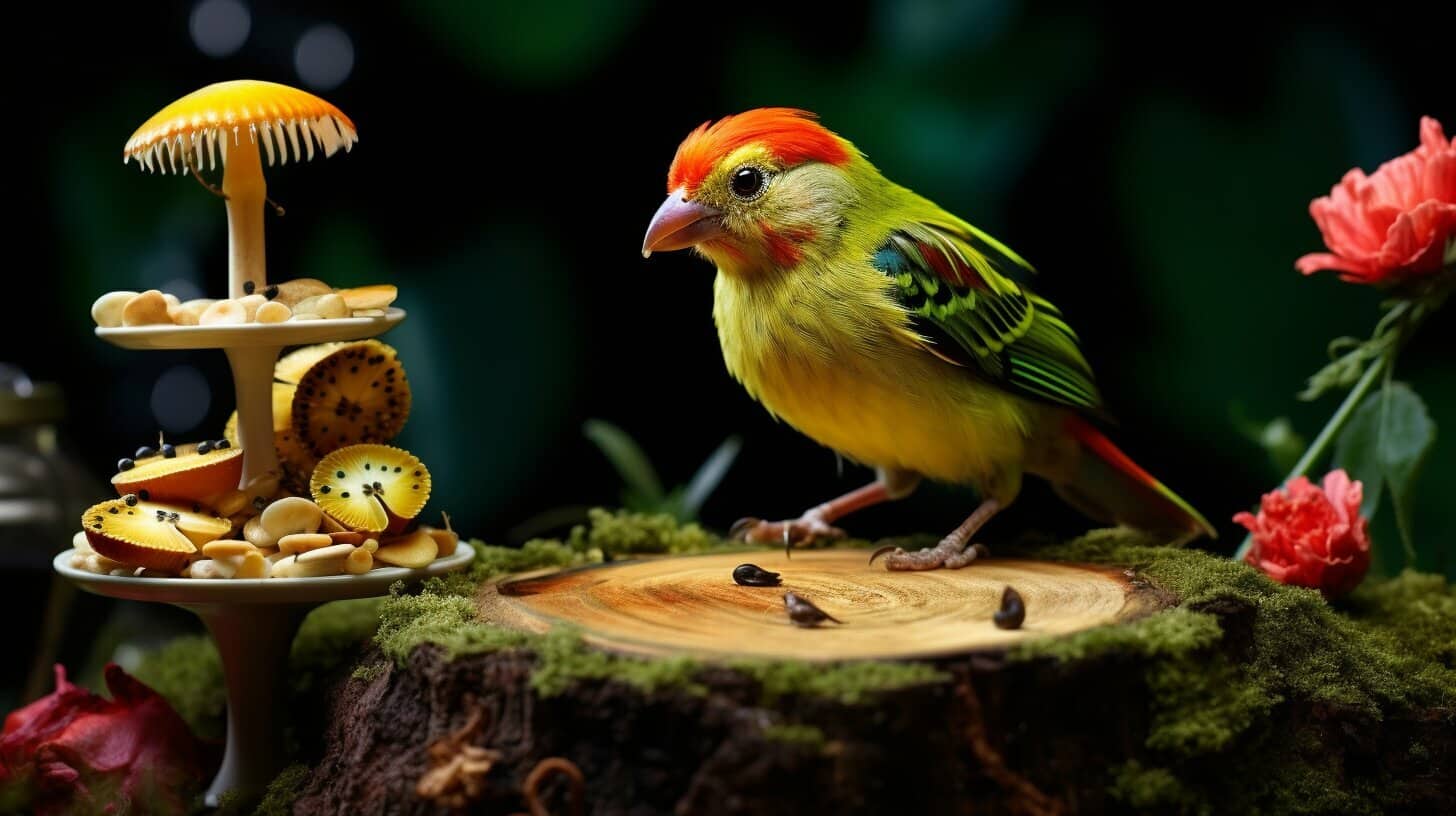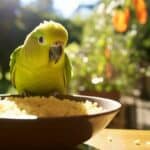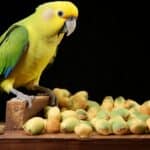If you’re a pet owner, you know that providing a balanced and nutritious diet is crucial for your pet’s health and well-being. When it comes to birds, such as kakarikis, their dietary needs are especially important to consider. With so many options available, knowing what foods are safe and beneficial for your pet bird can be challenging.
One food that you may be unsure about is mushrooms. While mushrooms are common in human diets, they can pose potential risks to birds like kakarikis. In this section, we will explore whether kakarikis can safely consume mushrooms. We will also discuss their dietary requirements and potential risks of feeding them mushrooms.
Can Kakarikis eat mushrooms? While Kakarikis can eat some varieties of mushrooms, other types pose a serious health risk to your bird. As the risks greatly outweigh the benefits of this foodstuff, you should not include mushrooms in your pet’s diet. Instead, provide safer foods, fruits and vegetables for your kakariki.
Key Takeaways:
- Kakarikis are primarily herbivores and require a balanced diet of fresh fruits, vegetables, and pellets specifically formulated for their nutritional needs.
- Mushrooms can be toxic to birds and may lead to digestive issues, liver damage, or even death.
- It’s essential to provide safe foods for kakarikis, such as fresh fruits and vegetables, and to introduce new foods gradually.
Understanding the Kakariki Diet
Before determining if kakarikis can safely consume mushrooms, it’s essential to understand their dietary needs. These birds are primarily herbivores and require a balanced diet of fresh fruits, vegetables, and pellets specifically formulated for their nutritional needs.
Their diet should consist of at least 70% fresh vegetables, such as kale, spinach, carrots, and fruits like apples, bananas, and berries. Pellets should make up no more than 30% of their daily diet and should be high-quality, with no artificial colours or flavours.
Providing a varied and nutritious diet is essential to maintain your kakariki’s health. A lack of proper nutrients can lead to serious health issues, including obesity, malnutrition, and even death.
Risks of Feeding Mushrooms to Kakarikis
Mushrooms are common in many human diets, but they can be dangerous for birds, including kakarikis. Some mushroom species can be toxic to birds and cause serious health issues such as digestive problems, liver damage, or even death. It is essential to understand the risks associated with feeding mushrooms to your pet bird.
While some mushrooms are safe for human consumption, it doesn’t mean they are safe for kakarikis. Even a small amount of a toxic mushroom can lead to severe health problems, so it is best to avoid feeding them altogether.
If you suspect your kakariki has consumed a mushroom, immediately seeking emergency veterinary care is crucial. Symptoms of mushroom poisoning in birds can include vomiting, diarrhoea, weakness, tremors, seizures, or changes in behaviour.
Remember to keep all mushrooms and other toxic foods out of reach of your pet bird to ensure their safety and well-being.
Safe Foods for Kakarikis
When feeding your kakariki, providing safe and nutritious foods is essential. Here are some of the best options:
- Fresh fruits and vegetables: Kakarikis love a variety of fresh produce, including apples, bananas, carrots, kale, and spinach. Remember to wash all fruits and vegetables thoroughly before serving, and remove any seeds or pits that could be a choking hazard.
- Pellets: High-quality pellets are specially formulated to give your bird all the necessary vitamins and minerals. Look for pellets low in fat and sugar, and ensure your kakariki can always access fresh water.
- Occasional treats: While treats should not make up a significant portion of your kakariki’s diet, occasional treats like seeds, nuts, or dried fruits can provide some variety and mental stimulation. However, be sure to offer these in moderation to avoid overfeeding.
Remember to introduce new foods gradually and monitor your kakariki for any signs of adverse reactions. If you are unsure about a certain food, it’s best to consult an avian veterinarian or a qualified bird nutritionist.
Mushrooms and Kakarikis: The Verdict
After considering their dietary requirements and potential risks, feeding mushrooms to your kakariki is not recommended. While some mushroom species may be safe, the risk of toxicity is too high to take chances with your pet bird’s health.
Remember to focus on providing a varied and nutritious diet consisting of fresh fruits, vegetables, and pellets formulated for their nutritional needs. Introducing new foods gradually and monitoring for adverse reactions is essential. A balanced diet supports your bird’s overall health and well-being and should always be a top priority.
Other Healthy Options for Kakarikis
While mushrooms are not recommended for kakarikis, there are plenty of other healthy options that your pet bird will enjoy. Varying their diet with a range of fresh fruits and vegetables is a great way to ensure they receive essential vitamins and minerals.
| Fruit | Veggies |
|---|---|
| Berries: Strawberries, Blueberries, Raspberries | Leafy Greens: Kale, Spinach, Collard Greens |
| Oranges, Apples, Bananas | Carrots, Sweet Potato, Cucumber |
| Mango, Pineapple | Broccoli, Zucchini |
High-quality pellets specifically formulated for kakarikis should also be a staple in their diet. These pellets provide a balanced mix of nutrients, minerals, and vitamins essential for their health.
Occasional treats like seeds or nuts can also be offered, but it’s important to remember that they should be given in moderation. Consult with an avian veterinarian or a qualified bird nutritionist to ensure your kakariki’s diet meets their specific needs.
Signs of Mushroom Toxicity in Birds
If your kakariki accidentally consumes a toxic mushroom or you suspect mushroom toxicity, it’s essential to be aware of the potential signs. Some of the symptoms your bird may display include:
- Vomiting
- Diarrhoea
- Weakness
- Tremors
- Seizures
- Changes in behaviour
If you observe any of these symptoms, seeking immediate veterinary assistance is critical. Early intervention can significantly affect your bird’s prognosis and ability to recover. Remember always to take precautions to ensure your kakariki’s safety and well-being.
Importance of Providing a Balanced Diet
As a kakariki owner, it’s vital to understand the importance of providing a balanced and nutritious diet for your pet bird. A well-rounded diet can help prevent nutritional deficiencies, maintain a healthy weight, and support their overall health and well-being.
Offering a variety of safe foods is essential to ensure your kakariki receives all the necessary nutrients. Fresh fruits and vegetables, such as apples, bananas, carrots, and leafy greens, are excellent options for their diet. Additionally, high-quality pellets formulated for their nutritional needs can offer a convenient and reliable source of nutrition.
Remember to introduce new foods gradually and monitor your kakariki’s reaction. While some foods may be safe for humans, they may not suit your pet bird. Consult with an avian veterinarian or a qualified bird nutritionist to ensure your kakariki’s diet meets their needs.
Conclusion
After exploring whether kakarikis can eat mushrooms, it’s clear that it’s best to avoid feeding them to your pet bird. While mushrooms are part of many human diets, some species can be toxic to birds and pose a risk to their health.
Instead, focus on providing a balanced and varied diet consisting of fresh fruits, vegetables, and pellets formulated for their nutritional needs. These food options are generally safe for kakarikis and can ensure they receive all the necessary nutrients for their well-being.
It’s important to remember to introduce new foods gradually and monitor your bird’s reaction. Consult with an avian veterinarian or bird nutritionist to ensure their dietary needs are met. Your kakariki can lead a happy and healthy life with the right care and attention.
FAQ
Q: Can kakarikis eat mushrooms?
A: No, mushrooms are not recommended for kakarikis due to the potential risk of toxicity.
Q: What is the kakariki diet?
A: Kakarikis require a balanced diet consisting of fresh fruits, vegetables, and pellets formulated for their nutritional needs.
Q: Are mushrooms toxic to kakarikis?
A: Some species of mushrooms can be toxic to birds, including kakarikis. It is best to avoid feeding mushrooms to your pet bird.
Q: What are safe foods for kakarikis?
A: Safe foods for kakarikis include fresh fruits (such as apples and bananas), vegetables (such as carrots and leafy greens), and high-quality pellets.
Q: Can I feed my kakarikis mushrooms?
A: It is not recommended to feed mushrooms to kakarikis due to the potential risks involved.
Q: What other healthy options are there for kakarikis?
A: Besides fruits and vegetables, you can offer high-quality pellets and occasional treats like seeds or nuts to your kakarikis.
Q: What are the signs of mushroom toxicity in birds?
A: Signs of mushroom toxicity in birds may include vomiting, diarrhoea, weakness, tremors, seizures, or changes in behaviour. If you observe any of these symptoms, seek immediate veterinary assistance.
Q: Why is a balanced diet important for kakarikis?
A: A balanced diet is crucial for kakarikis’ overall health and well-being. It helps prevent nutritional deficiencies, maintain a healthy weight, and support their immune system.



Have comments or questions about this article? Then get involved!
Spotted an error or something we have missed? Let us know